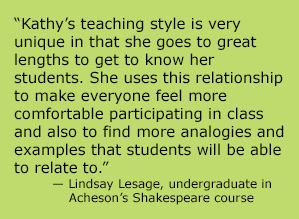 |
|
Dr. Katherine Acheson, Professor in the Department of English Language and Literature and Associate Dean of Arts, Undergraduate Programs. |
Written by Maggie Bradley, Special Projects (Teaching Awards), CTE
For Dr. Katherine Acheson, teaching is about empowering students. She is an idealist who believes that universities build not just employees, but citizens. She is motivated by a passion for supporting students as they expand their knowledge of themselves and the world around them.
Acheson says that she believes “in the idea that we [the instructors] build competencies and skills that are transferable to people’s everyday lives, including their working lives. We build consciousness and the capacity to participate as human beings in our world.” For students, this experience empowers them for future success; for Acheson, it’s personally rewarding to help students discover what they are capable of achieving.

Beyond the aforementioned skills, Acheson also encourages her students to expand their world view by envisioning alternative ways of being. Reading, she notes, is vital in this regard because “literature provides a grand set of thought experiments.” Acheson knows that what she wants her students to achieve can be complex and challenging – but she also believes that at even the most basic levels, they should be very proud of what they can accomplish.
In her 100-level Shakespeare course, Acheson invites her students to imagine themselves as detectives, meticulously piecing together literary clues to support their arguments. These critical thinking skills are complemented by her emphasis on helping students learn to write effectively: “Learning to write well,” she says, “is just profoundly liberating. It gives you power and control over things that you can’t get any other way.”
Acheson’s advice for undergraduate students is to participate fully and interact vigorously with all learning experiences, a goal that she aims to facilitate in her courses. In this term’s Shakespeare course, for example, she encouraged her students to interact with the rubric that she had developed for an assignment: they were each given the option of determining the weighting for the various sections of the rubric. Students were also free to propose an assignment other than the traditional essay. For this alternative option, students submitted a proposal in advance so that they and Acheson could develop a rubric in collaboration.
Acheson hopes that her students who are majoring in English remember that “their commitment to reading and their capacity for writing are special things that they can use to help other people and make their way in the world. I don’t want them to take it for granted.”
When asked to describe the essence of good teaching, Acheson’s response is brief: “To help people do better.”
More Resources
CTE has developed more than 100 Teaching Tips. Each one is a succinct document that conveys useful ideas and practical methods for effective teaching. Some of the Teaching Tips that are relevant to the strategies mentioned in this Teaching Story include the following: